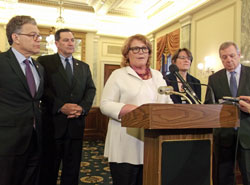 In what could be seen as a sign that an unpopular decision is about to be rendered by the Obama Administration on ethanol and biodiesel, a select group of Senate Democrats have met with the White House. The Hill reports White House adviser John Podesta met with the group on Thursday to discuss the Environmental Protection Agency’s (EPA) plans regarding the Renewable Fuel Standard (RFS).
In what could be seen as a sign that an unpopular decision is about to be rendered by the Obama Administration on ethanol and biodiesel, a select group of Senate Democrats have met with the White House. The Hill reports White House adviser John Podesta met with the group on Thursday to discuss the Environmental Protection Agency’s (EPA) plans regarding the Renewable Fuel Standard (RFS).
The senators said they wanted to discuss “urgent concerns” with the RFS, which requires that diesel and gasoline refiners mix a certain amount of renewable fuels such as biodiesel and ethanol into their traditional fuels each year. The Environmental Protection Agency proposed last year to keep the biodiesel volume in 2014 at least year’s level, despite an increase in biodiesel production, and reduce the ethanol volume.
The EPA has not yet finalized its 2014 volumes for renewables.
[Minnesota Senator Al] Franken and his colleagues took particular issue with the biodiesel mandate.“Such a decision would not only harm the economic growth surrounding biodiesel production in our states, but would be a setback in our national efforts to continue boosting U.S. energy security while also reducing greenhouse gas emissions,” they wrote.
The National Biodiesel Board (NBB) seems concerned about the meeting as well and issued a statement from from Vice President of Federal Affairs Anne Steckel:
“While we are encouraged by these discussions, the biodiesel industry remains concerned that the Administration still appears to be considering a proposal that would backtrack from last year’s proven production and that threatens biodiesel plants around the country. The fact is that biodiesel is the most successful Advanced Biofuel under the RFS, yet it could see its production cut significantly. This meeting, which was originally requested by a diverse group of 14 Democratic senators from across the country, makes clear that there are serious concerns about the impact that the proposal would have on jobs and economic growth nationwide, in states from Rhode Island to Minnesota to Washington state. This is a critical decision, not just for the biodiesel industry but for the future development of clean, American-made renewable fuels that will help us reduce our dangerous dependence on petroleum.”
Many of those senators participating in this week’s meeting were also critical back in May on the Obama Administration’s proposal to cut the amount of biodiesel and ethanol to be mixed into the nation’s fuel supply, with some of the President’s staunchest backers calling it “disastrous” and a miserable failure of policy.

